Following changes have been developed and added:
 1. Added support for two-factor authorization using one-time passwords from the Google Authenticator application or any other applications that support one-time OTP passwords. The user can choose in his profile which two-factor authorization he wants to use. He can choose to use applications, or a one-time password will be sent by E-Mail. Any applications that support OTP verification can be used for use, including the built-in tools of smartphone operating systems, not just Google Authenticator.
1. Added support for two-factor authorization using one-time passwords from the Google Authenticator application or any other applications that support one-time OTP passwords. The user can choose in his profile which two-factor authorization he wants to use. He can choose to use applications, or a one-time password will be sent by E-Mail. Any applications that support OTP verification can be used for use, including the built-in tools of smartphone operating systems, not just Google Authenticator.
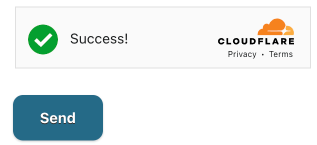 2. Added support for a new type of captcha on the Cloudflare Turnstile Sites website. This type of captcha provides the highest quality protection against spam bots, and also works as comfortably as possible for site visitors who do not need to make a choice of annoying pictures or writing text. Everything is as simple as possible, automatically and quickly.
2. Added support for a new type of captcha on the Cloudflare Turnstile Sites website. This type of captcha provides the highest quality protection against spam bots, and also works as comfortably as possible for site visitors who do not need to make a choice of annoying pictures or writing text. Everything is as simple as possible, automatically and quickly.
 3. Added the ability to limit the number of downloads for files uploaded to the site. To do this, in the settings of user groups, you can specify for this group how many files per day they are allowed to download. At the same time, downloads of unique files are recorded, and not just download attempts. For example, you have allowed downloading five files a day, a visitor has downloaded five files, and he will be prohibited from downloading any other files after that, but if some file was corrupted or accidentally deleted during downloading, then these files that he has already downloaded, he can also download again without problems. If you do not want to set a download limit, then this restriction can also be disabled.
3. Added the ability to limit the number of downloads for files uploaded to the site. To do this, in the settings of user groups, you can specify for this group how many files per day they are allowed to download. At the same time, downloads of unique files are recorded, and not just download attempts. For example, you have allowed downloading five files a day, a visitor has downloaded five files, and he will be prohibited from downloading any other files after that, but if some file was corrupted or accidentally deleted during downloading, then these files that he has already downloaded, he can also download again without problems. If you do not want to set a download limit, then this restriction can also be disabled.
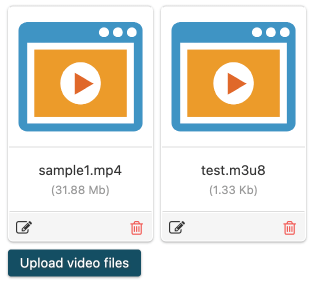 4. Added a new type of additional fields for publications: “Video playlist”. In this field, you can quickly upload video files that will be displayed on the site as a ready-made video player with a list of downloaded files to play them. Thus, you can quickly and conveniently organize the publication of videos on your website. In the properties of the field, you can set the maximum number of uploaded files, as well as the maximum file size allowed for uploading.
4. Added a new type of additional fields for publications: “Video playlist”. In this field, you can quickly upload video files that will be displayed on the site as a ready-made video player with a list of downloaded files to play them. Thus, you can quickly and conveniently organize the publication of videos on your website. In the properties of the field, you can set the maximum number of uploaded files, as well as the maximum file size allowed for uploading.
5. Added a new type of additional fields for publications: “Audio playlist”. In this field, you can quickly upload audio files that will be displayed on the site as a ready-made audio player with a list of downloaded files to play them. Thus, you can quickly and conveniently organize the publication of audio files on your website. In the properties of the field, you can set the maximum number of uploaded files, as well as the maximum file size allowed for uploading.
6. Support for full-text search has been added to the quick search system on the site. Now a quick search on the site, depending on what is enabled in the settings, will also use either full-text or simple search. Thus, the results of a quick search will not differ from the results from the full search section on the site, if the full-text search mode on the site was enabled.
7. For a quick search on the site, support for the template system has been added. Now a new fastsearchresult.tpl template file is used to output search results, in which you can use all tags without exception that the short news output template supports. Thus, you can output additional fields and design the results the way you want without any restrictions.
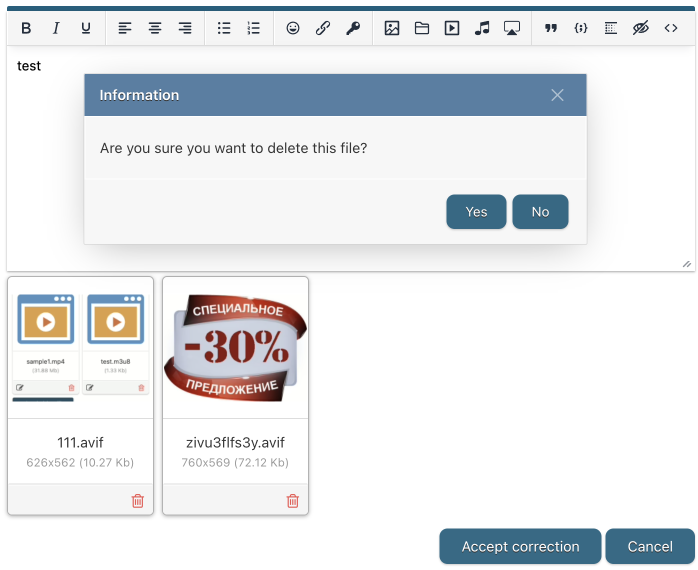 8. When editing comments on the site, if the uploaded images are displayed using the {images} tag in the comments, a list of uploaded images is added to quickly remove images from the edited comment.
8. When editing comments on the site, if the uploaded images are displayed using the {images} tag in the comments, a list of uploaded images is added to quickly remove images from the edited comment.
 9. Added output of uploaded images for comments in the admin panel in the comments editing section. Thus, you can immediately see the images if a separate output tag is used for them in the template and they are not in the comment text. And you can also quickly delete uploaded images in one click, if necessary.
9. Added output of uploaded images for comments in the admin panel in the comments editing section. Thus, you can immediately see the images if a separate output tag is used for them in the template and they are not in the comment text. And you can also quickly delete uploaded images in one click, if necessary.
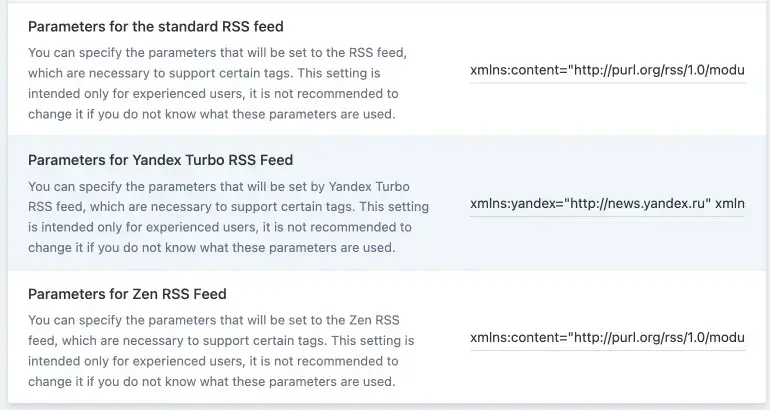 10. The ability to specify the properties of RSS feeds that are used on the site has been added to the script settings. These properties are used to determine which tags are allowed in the stream, their standards, and so on. You can specify properties for all three streams used on the site. These properties are necessary for various services that use these streams in their work, thus, if some service has changed the requirements for RSS feeds, you can independently specify the necessary parameters in the settings without having to wait for DataLife Engine updates or edit the script files yourself. You can also use streams in general for some other proprietary services, and set the necessary parameters yourself.
10. The ability to specify the properties of RSS feeds that are used on the site has been added to the script settings. These properties are used to determine which tags are allowed in the stream, their standards, and so on. You can specify properties for all three streams used on the site. These properties are necessary for various services that use these streams in their work, thus, if some service has changed the requirements for RSS feeds, you can independently specify the necessary parameters in the settings without having to wait for DataLife Engine updates or edit the script files yourself. You can also use streams in general for some other proprietary services, and set the necessary parameters yourself.
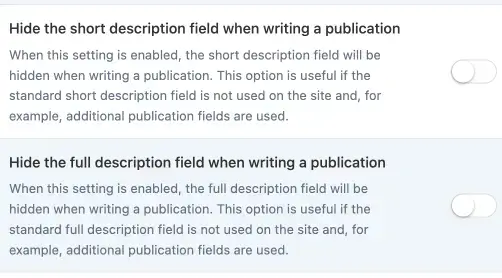 11. The ability to hide the short description field when adding and editing publications has been added to the script settings in the admin panel. You can disable this field if you do not use it when writing publications, so that it does not interfere with you. This innovation will be useful for those who use, for example, only additional fields with their own properties.
11. The ability to hide the short description field when adding and editing publications has been added to the script settings in the admin panel. You can disable this field if you do not use it when writing publications, so that it does not interfere with you. This innovation will be useful for those who use, for example, only additional fields with their own properties.
12. The ability to hide the full description field when adding and editing publications has been added to the script settings in the admin panel. You can disable this field if you do not use it when writing publications, so that it does not interfere with you. This innovation will be useful for those who use, for example, only additional fields with their own properties.
13. Support for new tags has been added for the news addition template (addnews.tpl): [allow-shortstory] text [/allow-shortstory] which output the text enclosed in them if the support for the short description field is enabled in the script settings, and hide the text if this field is disabled. Tags have also been added: [allow-fullstory] text [/allow-fullstory] which output the text enclosed in them if the full description field is enabled in the script settings, and hide the text if this field is disabled.
 14. Added the ability to sort publications by the date of their editing. The sorting order can be performed in the script settings in the control panel, on the site by the user himself if allowed, as well as in the settings of each category separately.
14. Added the ability to sort publications by the date of their editing. The sorting order can be performed in the script settings in the control panel, on the site by the user himself if allowed, as well as in the settings of each category separately.
 15. Added the ability to save database backups to external storage. To do this, you can enable the “Save backups to external storage” setting in the script settings. When this option is enabled, the backup will be automatically transferred to external storage.
15. Added the ability to save database backups to external storage. To do this, you can enable the “Save backups to external storage” setting in the script settings. When this option is enabled, the backup will be automatically transferred to external storage.
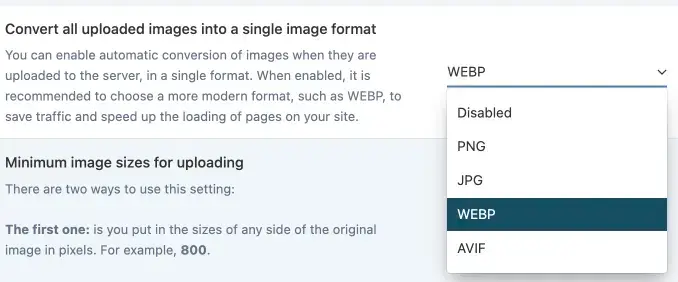 16. Added the ability to automatically convert uploaded images to one selected format in the format script settings. Instead of setting up automatic conversion of uploaded images to WebP format, you can choose one of four formats: PNG, JPG, WEBP, AVIF. Or you can disable automatic conversion to another format altogether and the image will remain in the format it was originally in.
16. Added the ability to automatically convert uploaded images to one selected format in the format script settings. Instead of setting up automatic conversion of uploaded images to WebP format, you can choose one of four formats: PNG, JPG, WEBP, AVIF. Or you can disable automatic conversion to another format altogether and the image will remain in the format it was originally in.
 17. Added the ability to use not only jаvascript tools for deferred image loading, but also native browser support. Now in the script settings you can choose the type of deferred download: Disabled, enabled using jаvascript, and enabled using native browser support. Native browser support works more accurately and faster, does not require loading additional scripts to the page, but it is supported only by modern browsers. Not all visitors to your site may have such browsers. If the user uses the old browser, he will see the image in any case, but the delayed download will not work for him.
17. Added the ability to use not only jаvascript tools for deferred image loading, but also native browser support. Now in the script settings you can choose the type of deferred download: Disabled, enabled using jаvascript, and enabled using native browser support. Native browser support works more accurately and faster, does not require loading additional scripts to the page, but it is supported only by modern browsers. Not all visitors to your site may have such browsers. If the user uses the old browser, he will see the image in any case, but the delayed download will not work for him.
18. For image output tags and embedded frames (img and iframe), the ability to add an attribute has been added loading=”lazy” when adding publications. To add native deferred loading of images and frames by browsers that support this attribute.
19. Added support for new global tags: [category-description] text [/category-description], which output the text enclosed in them if the category being viewed has a given category description. And also added tag support: [not-category-description] text [/not-category-description], which output the text enclosed in them if the category has no description. These tags will be useful when designing various template blocks for cases when a description is set, and for cases when there is no description.
20. For users who are in the “Editors-in-Chief” group, the ability to change the author of publications has been added. Previously, only site administrators had such an opportunity.
21. For the plugin system, the ability has been added to specify several plugins that are required to be present in the system for the plugin to be installed to work. To assign multiple plugins, their names are separated by commas. Previously, it was possible to specify only one mandatory plugin.
22. Added automatic switching to a dark theme in the DataLife Engine control panel (if automatic night mode is enabled) depending on the installed operating system theme. Now switching will be not only by time, but also if the theme of the operating system has been switched to dark, then switching will also be performed in the control panel.
23. Added support for a new tag for the RSS output template {full-story limit=”X”} which outputs the text of the full news without HTML formatting, while the publication text itself is reduced to the specified X number of characters.
24.When using comparison using tags [if field = “value”] text [/if] for additional fields with the type “date” and “date and time”, automatic verification has been added as date values. When comparing, you can use the date in English format, for example, “2020-09-01” or “10 September 2020” or “next Thursday” or “+1 day” or “next Thursday” or in unix format, and also use not only the equal sign, but also check whether the date is greater or less than the specified value. Previously, this type of fields was compared simply as a text value.
25. Improved comparison system using tags [if field = “value”] text [/if] when using the values of additional fields in comparison. Additional conversion of previously escaped characters into regular characters is performed, which simplifies comparison.
26. Simplified system of extended registration on the site, the visitor will need fewer steps during registration when passing the extended registration on the site.
27. For templates for displaying short and full news, as well as for the main page template (shortstory.tpl, fullstory.tpl, main.tpl) added support for new tags: [xfvalue_X video=”Nr”] which outputs the videos uploaded for an additional field with the type “Video playlist” with the selected number separately. Where “X” is the name of the additional field, and “Nr” is the number of the video from the playlist, [xfvalue_X video-url=”Nr”] which outputs uploaded URLs for an additional field with the “Video playlist” type, individually. Where “X” is the name of the additional field, and “Nr” is the number of the video from the playlist, [xfvalue_X video-description=”Nr”] which outputs the video descriptions uploaded for an additional field with the “Video playlist” type, separately. Where “X” is the name of the additional field, and “Nr” is the number of the video from the playlist. [xfgiven_X video=”Nr”] text [/xfgiven_X video=”Nr”] which output the text enclosed in them if the video with the specified number is present and uploaded in an additional field, where X is the name of the additional field, and Nr is the number of the video, [xfnotgiven_X video=”Nr”] text [/xfnotgiven_X video=”Nr”] which output the text enclosed in them if the video with the specified number is not in the additional field, where X is the name of the additional field, and NR is the number of the video. All these tags will be useful when using your own third-party video players to organize video viewing on your site.
28. For templates for displaying short and full news, as well as for the main page template (shortstory.tpl, fullstory.tpl, main.tpl) dded support for new tags: [xfvalue_X audio=”Nr”] which outputs the videos uploaded separately for an additional field with the “Audio Playlist” type. Where “X” is the name of the additional field, and “Nr” is the number of the audio file from the playlist, [xfvalue_X audio-url=”Nr”] which outputs uploaded URLs for an additional field with the “Audio Playlist” type, individually. Where “X” is the name of the additional field, and “Nr” is the number of the audio file from the playlist, [xfvalue_X audio-description=”Nr”] which outputs the descriptions of the audio file uploaded for an additional field with the “Audio Playlist” type, separately. Where “X” is the name of the additional field, and “Nr” is the number of the audio file from the playlist. [xfgiven_X audio=”Nr”] text [/xfgiven_X audio=”Nr”] which output the text enclosed in them if the audio with the specified number is present and loaded in an additional field, where X is the name of the additional field, and Nr is the number of the audio file, [xfnotgiven_X audio=”Nr”] text [/xfnotgiven_X audio=”Nr”] which output the text enclosed in them if the audio with the specified number is missing in the additional field, where X is the name of the additional field, and Nr is the number of the audio file. All these tags will be useful when using your own third-party audio players to organize audio on your site.
29. The formation of the meta tag of the title of the page when displaying the main page has been changed if the use of the static main page as the main page is set. Now only the main header specified in the script settings in the control panel is used in the header.
30. The system of quick editing of comments on the website and in the control panel has been improved. In case of any error, an error message will be displayed to the user in a pop-up window, while the possibility of making further changes to the comment will remain to eliminate the errors that have occurred.
31. Improved support for additional fields having the “One line” type with the safe mode option. For these fields, the ability to use URLs as content has been added, and they can be used to insert links in publications.
32. Changes have been made to prevent the occurrence of links to publications whose length exceeds the total URL length limit of 255 characters set by the standards.
33. The system for displaying reduced copies of images has been updated. The appearance has become even more modern, smoother animation has been added, more zoom levels.
34. Added the use of more cryptographically secure algorithms in various random value generators used by various user identification functions.
 35. For the TinyMCE visual editor, the ability to set the text size quickly and conveniently in any values, and not just from a list of predefined sizes, has been added.
35. For the TinyMCE visual editor, the ability to set the text size quickly and conveniently in any values, and not just from a list of predefined sizes, has been added.
36. For the Froala visual editor, the ability to use any font icons in texts has been added, not just FontAwesome old versions.
37. Significantly accelerated the work of DLE and reduced the load on the server when generating RSS feeds for Turbo pages and Yandex Zen.
38. Added the ability to assign new keywords to the tag cloud in mass actions on publications, to use special characters in these tags, such as quotation marks and a number of others that are supported by the tag cloud.
39. For the [mediа=…] tag, the ability to insert short videos (shorts), as well as playlists from the Youtube service, has been added. Previously, it was possible to insert only regular videos.
40. The system of automatic transliteration of links for SEO URLs has been improved, so that when forming links, the remnants of HTML entities do not fall into these links.
41. When writing additional fields in a publication with the “Cross-references” option, if the tag was written using a different letter case, then when displaying this field in bread crumbs and meta tags of the title, a word with the same letter case as it was written in the publication will be used, and not in small letters as it was previously. At the same time, the URL remains unchanged as before.
42. When writing words for a tag cloud in a publication, if the tag was written using a different letter case, then when displaying this tag in bread crumbs and title meta tags, a word with the same letter case as it was written in the publication will be used, and not in small letters as it was before. At the same time, the URL remains unchanged as before.
43. The minimum requirement for DLE is the presence of PHP 8.0 and higher on the server. Previously, the minimum version of PHP was 7.4. In addition, the recommended requirements for the PHP version were lowered, now it is also enough to have the PHP 8.0.x line, not 8.1.x, for all DLE functions to work
44. The TinyMCE visual editor has been updated to the current line.
45. Fixed an issue where comments were combined into a single line when using the BBCODES editor for comments.
46. Fixed an issue where extra lines appeared when massively combining comments on the site, in the case of using visual editors for comments.
47. Fixed an issue where when changing the search bar in the search, there was no return to the first page of the search if the user is not on the first page and uses only the keyboard.
48. Fixed an issue where the {related-ids} tag in the full news template worked incorrectly when the publication was first shown on the site.
49. Fixed an issue where checking some fields in the [if field = “value”] text [/if] tag did not work when connecting custom output of publications using the {custom …} tag
50. Fixed an issue where it was impossible to add new keywords to the tag cloud in some cases when performing mass actions on news.
51. Fixed an issue where some buttons in the BBCODE editor might not be pressed in some cases when quickly editing publications on the site.
52. Fixed a problem in which a non-valid layout was formed in the case of using a tree layout of comments, if the nesting limit of comments was reached.
53. Fixed an issue where the image upload button for additional fields with the “Image Gallery” type could not be unlocked when transferring an image from one gallery to another.
54. Minor issues in the script that were detected and stated earlier have been fixed.